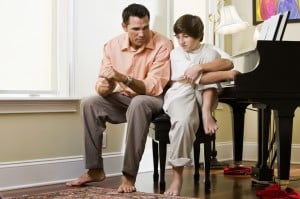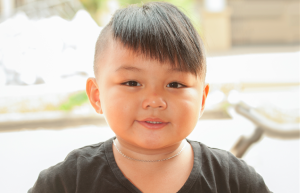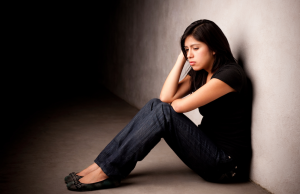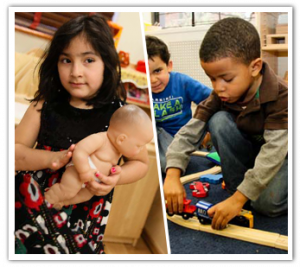I stood up to walk away from the makeshift office space in my bedroom; it was time for a well-earned break from work. I’d been editing a client’s website copy all morning, and my eyes were beginning to blur words in protest.
As I walked toward the kitchen, I felt my mouth widen to a smile as I heard my daughters giggling in the sunroom – their makeshift office space. They were both lying on their bellies, with their long brown legs stretched along the carpeted floor, and their energies deep in research and conversation.
Marley (age 11) and Sage (age 9) were happily engaged in their studies, flanked by their usual tools: a laptop, an iPad, two notebooks, several sheets of paper, empty mugs formerly filled with mint tea, and a copy of The Last Olympian, the final book in Rick Riordan’s wildly popular Percy Jackson series.
This, like many of their projects, came from a simple single desire.
In this instance, Sage decided she wanted to rewrite some of the scenes from that particular book as well as introduce some new characters to the storyline. Her big sister, Marley, was serving as Sage’s hired editor, focusing on grammar and flow in efforts to turn Sage’s drafts into fully formed stories about the original characters (OCs) they planned to bring into Percy Jackson’s life.
In my daughters’ worlds, research and character development for OCs in various literary genres is a serious undertaking.
They use the Internet and local libraries to research historical, cultural, economic, linguistic, and artistic aspects of their characters so that they can create detailed backstories for their readers.
Their processes require research, advanced comprehension, some degree of planning, and a writing/rewriting process that looks similar to mine as a professional writer.
Many people find it surprising that none of what our girls do daily is part of a mandatory assignment from school or from their dad and me. Instead, their projects are self-initiated and sustained.
They get ideas; they set goals and timelines; they schedule meetings with other people of various ages, all over the planet, via web-chats and phone calls, and sometimes in person meet-ups.
They do these things as a way of immersing themselves in their interests. And as a way of creating community to facilitate learning, socialization, friendly competition at times, and of course, fun.
They are unschoolers – part of a longtime movement away from schedules and schools, over to self-guided exploration of life and learning.
As an unschooling family, we believe that school is one example of how a healthy childhood can be spent – but that there are other options, and contrary to popular belief, children can (and will) still learn, engage, socialize, and be challenged while preparing for adulthood through various non-school experiences.
The Misunderstandings That Feed into the Myths
When my family first began this journey nearly five years ago, most people lunged at the opportunity to caution us against “yanking the girls out of school to watch TV and play video games all day.”
Still today, unschoolers are still vastly misunderstood.
Our girls are neither schooled nor homeschooled, which means there’s no curriculum that gauges our daughters’ progress or aptitude in specific topics. That’s tough for a lot of people to understand, and I see why.
Since most of us were brought up to believe that compulsory education is the path to achieving the goals of financial success and responsible adulthood, we’ve learned to rely on to the school system to arm us with the skills to attain those goals.
When teachers and students are removed from a child’s learning environment, many adults become concerned in part because they’re not familiar with any other models for readying children for life.
But not all schooled children grow up to become successful, responsible adults.
And in many cases, children are unhappy or uncomfortable in their school settings because they don’t learn the way other children learn, or because they have unaddressed personal circumstances that stop them from focusing on learning.
Even with highly resonating accounts of schools failing young boys, mislabeling Black girls, and being underfunded solely because they are in low socioeconomic areas, many adults are still leery about alternative learning options that do not include school.
That’s because alternative education movements are often plagued with a lot of misconceptions about how non-schooling parents facilitate learning and prepare children to thrive in adulthood.
Some of the common concerns around unschoolers’ barriers to thriving include limited exposure to advanced learning techniques, lack of social skills, insufficient college preparedness, and poor time management skills.
Myths about lazy parents and wild children perpetuate false ideas about children who learn outside of school environments, as well as their parents.
By exploring some of the most pervasive among the myths – one about unschooling parents, and the other about unschooled children – we can gain broader perspective and see specific examples of unschooling.
My hope is that this leads to more of us giving power to the voices of the people who actually unschool, and not to the media or other voices who simply publicly judge it.
Myth #1: Parents Who Unschool Their Children Are Lazy
Most unschoolers I know chose this path because school doesn’t meet the basic needs they see as imperative to their child’s development.
School generally focuses on academics and leaves out the exposure and cultivation of critical personal development prioritization that help us develop healthy emotional, physical, spiritual, and social skills.
We see unschooling as a way of creating space for our daughters to understand themselves outside of the messages that promote unhealthy self-silencing, and separate children from personal power, cultural relevance, and self-exploration.
Our challenges with school include the heavy focus on test scores, the use of often-outdated materials that don’t tell children the truth about world history, and an environment that doesn’t teach them how to preserve aspects of their own culture and intuition as part of their journey toward adulthood.
It would take far less effort for us to put our children back in school and talk with their teachers about how well our daughters are following the county’s pre-defined curricula.
We’re taking what feels like a more active approach to expanding our daughters’ learning environments by taking geographic limitations, public school politics, private school agendas, and segmented blocks of learning time out of the equation.
Through our lens as Black unschoolers in particular, we see unschooling as an act of resistance – a way of reclaiming ourselves and our community by helping our daughters create environments unboxed by real threats to thriving such as the school-to-prison pipeline and racism from teachers.
Guided by our daughters’ interests, the four of us have become more engaged participants in their learning experiences by actively designing their community based on global access to people, information, and technology.
That doesn’t feel like laziness; it feels like empowerment.
Myth #2: Children Who Unschool Will Not Have Good or Healthy Social Skills
The issue of socialization is a common query for homeschoolers and unschoolers alike.
Because school is the standard model for getting children out of the home and into “real life” issues like conflict management and group participation, many adults aren’t clear on how children might practice these skills if they’re not schooled.
A common misconception is that unschooled children sit around in their messy rooms, playing video games and eating fake-cheese snacks all day.
That myth lines up with the same lazy parent idea, and is based not in reality, but rather a generalization that is exploited and popularized by heavily biased perspectives about unschooling.
Child-led learning (another unschooling synonym) as been heavily discussed and grossly misunderstood since its introduction to mainstream America through a 2010 Good Morning America segment centered on radical unschoolers, Christine Yablonski, Phil Biegler, and their two children.
The segment explored the “Utopian ideal” of child-led learning and not-so-subtly warned its audience about the gaps between this idea and “reality.”
I saw it as an unapologetically judgmental lens that painted the picture of nonchalant parents and their disillusioned children, leaving many with that impression of unschooling.
They took one family’s format and then introduced the opinions of parenting “experts” who proceeded to caution viewers about the risks of “cooperating with your kid.”
The reality is that child-led, school-free learning environments are far more diverse than that.
Some are less structured than others, some are travel-focused, others are localized and focus on deep community immersion, and others may include aspects of schooling such as group study and personal tutoring.
In a recent interview about unschooling and entrepreneurship, I offered some specific examples of how my daughters’ friendships and social circles take form.
Essentially, unschooling families tend to develop relationships with people all over the world because their engagement is not limited to people who happen to be geographically close to us by means of our careers, school, or social circles.
Our daughters, like us, organically connect with people based on shared interests and goals.
For example, Marley has friends of various ages who live in Japan, and she met them online through her interactions with aspects of Japanese culture and society. As a result, I now have Japanese friends with whom I communicate via e-mail, social media, and phone.
Our children are in the same online groups, go to the same conventions (or follow the hashtags), and through those interests, they and we now have a community.
In these settings, important social skills like conflict management, group participation, patience, and assertion are consistently put into practice.
Sage, as another example, has created community (and therefore practices social skills) in her offline classes (like gymnastics and violin) and online at sites like DIY.org, where she and her friends earn badges for everyday life skills, and participate in challenges to improve their skills of interest.
Focusing on the Whole Child, Schooled or Unschooled
To be clear, this is not an anti-school sentiment.
It’s also not about a right or wrong way to help children become more engaged in learning and developing critical life skills. Adults are standing up for children in a variety of effective ways, and I see that as a great thing.
Progressive educators, like sociologist Anna Brix Thomsen, are working inside the school system to tackle the question of why children become less excited about learning as they get older, and shifting the perception of how learning actually happens.
Committed child advocates and education activists, like Jeffrey Canada, are doing work that addresses the education of the whole child by creating solutions to common barriers to learning, such as poverty and personal safety.
And the wealthier ones among us, like Elon Musk, inventor and entrepreneur known for his contributions to SpaceX, PayPal, and Tesla Motors, who could hire anyone in the world to educate their children, publicly share why they choose to nurture self-directed, child-led learning environments.
The point is that unschoolers are simply people who do not see school as their primary learning environment. We are as varied and vast as schooled children and their parents, and our living environments reflect those variations.
Some unschooling environments look like hybrids of school and homeschooling where there is a curriculum, but its purpose is only to serve as a loose guideline for general information to consider.
Others are more radical and include very little pre-set structure or studies.
And others, like in our home, focus on education through living, goal-setting, exploration of personal interests, and tapping into human and technological resources.
Just as with schooled children, there are many ways to facilitate learning, but with unschoolers, there is a primary difference: They are not told what to learn.
Instead, they are nurtured toward developing an understanding of how they learn, and they are using that knowledge to gather, explore, process, and utilize information that expands their knowledge of the world, and themselves within it.
All children deserve the opportunity to grow and to flourish. Perhaps we can look at ways to integrate more of the whole-child approach to learning, whether the children we love are schooled, homeschooled, or unschooled.
[do_widget id=’text-101′]
Akilah S. Richards is a Contributing Writer for Everyday Feminism. She is a six-time author, digital content writer, and lifestyle coach who writes passionately about self-expression, womanhood, modern feminism, location independence and the unschooling lifestyle. Connect with Akilah on Instagram, Tumblr, or her #radicalselfie e-home, radicalselfie.com. Read her articles.
Search our 3000+ articles!
Read our articles about:
Our online racial justice training
Used by hundreds of universities, non-profits, and businesses.
Click to learn more
Most Read Articles
- « Previous
- 1
- …
- 30
- 31
- 32




















